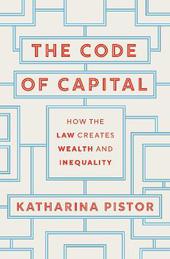
|
The Code of Capital: How the Law Creates Wealth and Inequality
Hardback
Main Details
| Title |
The Code of Capital: How the Law Creates Wealth and Inequality
|
| Authors and Contributors |
By (author) Katharina Pistor
|
| Physical Properties |
| Format:Hardback | | Pages:320 | | Dimensions(mm): Height 235,Width 155 |
|
| Category/Genre | Economics |
|---|
| ISBN/Barcode |
9780691178974
|
| Classifications | Dewey:332.041 |
|---|
| Audience | | Tertiary Education (US: College) | | Professional & Vocational | |
|---|
| Illustrations |
no illus.
|
|
Publishing Details |
| Publisher |
Princeton University Press
|
| Imprint |
Princeton University Press
|
| Publication Date |
28 May 2019 |
| Publication Country |
United States
|
Description
A compelling explanation of how the law shapes the distribution of wealth Capital is the defining feature of modern economies, yet most people have no idea where it actually comes from. What is it, exactly, that transforms mere wealth into an asset that automatically creates more wealth? The Code of Capital explains how capital is created behind
Author Biography
Katharina Pistor is the Edwin B. Parker Professor of Comparative Law and director of the Center on Global Legal Transformation at Columbia Law School. She is the coauthor of Law and Capitalism: What Corporate Crises Reveal about Legal Systems and Economic Development around the World and the coeditor of Governing Access to Essential Resources. She lives in New York City.
Reviews"One of the Financial Times' Best Books of 2019: Economics" "One of the Financial Times' Readers' Best Books of 2019" "One of Business Insider's Richard Feloni's best books of 2019 on how we can rethink today's capitalism and improve the economy" "A Project Syndicate Best Read in 2019" "The result is nothing less than a crisis theory of law. Law as it currently functions is, for Pistor, constitutive of the order that creates and perpetuates inequality, opacity, dysfunction, and crisis, and ultimately puts at risk the legitimacy of the rule of law as such."---Adam Tooze, New York Review of Books "Almost anybody who reads this book will benefit; a must-read for corporate lawyers, investment bankers, capital providers."---Rahul Saikia, Financial Times "Those of us concerned with inequality should be focusing a great deal of attention on the basics of valuation, which means looking hard at the way law makes money."---Roy Kreitner, LPEblog "The wealth drawn from both the digital darkness and the dark pools of Wall Street exists only by virtue of the law's encasement. . . . [Pistor's] metaphors allow us to see how, by ceding democratic control of law, we've 'depoliticized critical questions of self-governance,' preserving mobility for some and blocking it for others."---Quinn Slobodian, Boston Review "So much discussion around wealth and inequality involves gawking at statistics people don't understand. Katharina Pistor offers a fascinating argument as to why inequality is increasing, and does so without having to construct class identities, as Marxists feel compelled to do, or to make heroic assumptions about the rationality of human beings, as rational choice theorists would have it."---David Murphy, Open Letters Review "Through extensive case studies, Pistor demonstrates that no one deliberately set out to construct the 'empire of law.' Rather, it is the result of a decentralized, unplanned process in which individual private lawyers helped individual clients protect their assets through the use of pre-existing legal constructs."---Nouriel Roubini, Project Syndicate "The Code of Capital is a welcome interdisciplinary contribution which attaches fresh dimensions to debates on the political economy of wealth and inequality. . . .it is a valuable resource for anyone seeking to grapple with the formidable nature of global capital."---Juvaria Jafri, LSE US Centre "Pistor has exploded the belief of most people that financial instruments traded across the world are creatures of law of sovereign states and are secure . . . . [The Code of Capital is] a truly remarkable book bringing out clearly one of the major causes of periodic financial crisis."---Madras Sivaraman, International Journal of Environment Studies "In possibly one of the most important non-fiction books of the decade, Pistor shines a clear and sharp light on how legal codes - increasingly determined in private law offices in New York and London - shape the contours of economic activity, ownership, and control under contemporary global capitalism"---Jayati Ghosh, Project Syndicate "A thought-provoking read." * Business & Management *
|